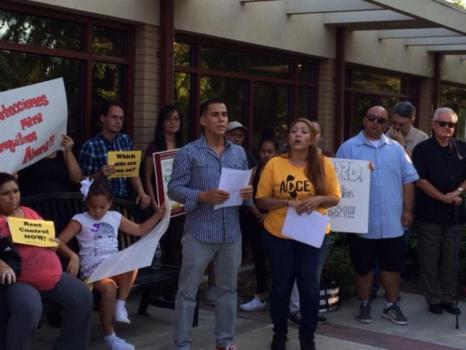Editorial: Rent control exacerbates housing shortage

Times file
Concord residents in July rally in support of rent control.
By East Bay Times editorial
PUBLISHED: November 2, 2016 at 12:04 pm | UPDATED: November 2, 2016 at 2:25 pm
Rent control has great political appeal. It conjures up notions of reduced housing costs and greater access.
But it’s not very effective at protecting poor or vulnerable tenants. And, as most economists agree, it discourages new construction, the very thing we need most to solve our housing crisis and control rents.
Moreover, it does not distinguish between tenants who need relief and those who don’t. High-income tenants benefit along with the poor. Consequently, wealthier tenants are more likely to stay in their units longer, leaving a tighter rental market for others.
California has a two-tier rent control system, under which local governments can only apply limits to multi-unit apartment buildings built before 1995. And state law allows landlords of those older buildings to reset rents to market rates for new tenants.
Some want to do away with those state restrictions so rent control can be expanded to all rental units. Meanwhile, more local jurisdictions are moving to establish rent control for pre-1995 buildings.
“Neither of these changes would increase the supply of housing and, in fact, likely would discourage new construction,” according to the state Legislative Analyst’s Office.
Nevertheless, four East Bay cities have rent-related measures on the ballot. We urge:
No on Richmond Measure L – This initiative would establish Richmond’s first rent-control law. It would restrict rent hikes to the increase in the regional Consumer Price Index and establish an entirely new rent board and independent bureaucracy that landlords would be required to fund.
No on Oakland Measure JJ – Placed on the ballot by the City Council, this measure would expand Oakland’s rent control laws to apply to units constructed before 1995 rather than the city’s current limit to units built before October 1980. It would also require landlords to seek city approval before increasing rents more than the Consumer Price Index.
No on Alameda Measure M1 – This extreme initiative that would set up an elected rent board with citywide elections every two years and its own bureaucracy; force landlords to pay relocation fees of up to $18,300 when evicting tenants even if the landlord or a family member wants to move back in; and limit rent increases to 65 percent of increases in the Consumer Price Index. Over time a landlord’s investment will fall far behind inflation.
Yes on Alameda Measure L1 – This modest City Council measure is a reasonable alternative to Measure M1. Measure L1 would affirm rules the council has already implemented. It requires mediation for rent increases over 5 percent and leaves oversight of rent rules with the council, thereby avoiding the cost of a parallel government bureaucracy and citywide elections.
No on Berkeley Measure U1 and Yes on Measure DD – Both measures seek to raise the tax on landlords from the current 1.081 percent of gross receipts to 2.88 percent (Measure U1) or 1.5 percent (Measure DD). For all the window dressing about paying for affordable housing, the money from both measures would go to the general fund and could be used for any governmental purpose. These are exactly the sorts of measures that discourage construction of needed housing. They’re both bad; but the political reality is at least one will probably pass. So vote for the least draconian.
No on Berkeley Measure AA – This would reduce housing supply by discouraging individual homeowners from renting out their houses. It would impose restrictions on what time of year owners can move back into their own homes and make them pay at least $15,000 in relocation fees to any tenant, no matter how wealthy, who has been in the unit a year or more.
|

